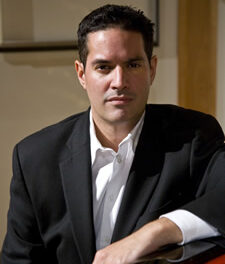As in sports, when the greatest players in music are assembled, the resulting sum is not necessarily the equal of its individual parts. Whether because of different stylistic approaches, ego or even too much of a good thing, it more often than not tends to disappoint. But, when the exception occurs, it can be an exhilarating and profound experience. The Jazz at Lincoln Center Orchestra (JLCO) was presented by Carolina Performing Arts, and led by Wynton Marsalis. The orchestra is comprised of fifteen superb musicians each of whom could easily front their own band, and often do. They come together as a cohesive superstar unit at the service of the great jazz composers, players and traditions that came before them.
The JLCO, celebrating their twenty-fifth anniversary, made a return visit to Memorial Hall on the campus of the University of North Carolina at Chapel Hill. Like nearly everything else today, concerts such as this are celebrity fueled, so it is doubtful that even a stellar group like this would have the same following and sold-out concerts without the name and presence of Wynton Marsalis. Much to his credit, Marsalis downplays his name recognition, playing from his third-tier perch with the trumpet section and announcing what they will be playing, the arranger and soloist(s). Big Bands such as this have become the musical equivalent of drive-ins, once fabulously prolific and a staple of most cities but now regrettably becoming a musically endangered species.
Talk about cool. There’s a certain aura surrounding merely watching the musicians swagger from the wings to the three-tiered bandstand. The music’s the thing — no showbiz b.s. here in the slightest. Marsalis simply thanks the audience and says he will keep talk to a minimum. When he said that the first half would be devoted to the music of Duke Ellington, the audience swooned. The gig opened with “The Mooch,” not to be confused with the probably more well-known Cab Calloway hit “Minnie the Moocher.” This up-tempo opener was followed by the quiet, deliciously lyrical “Mood Indigo,” one of Duke’s biggest hits and perhaps even his signature song. This showed that you don’t have to speak loud and fast to get someone’s attention, as a trombone, clarinet and trumpet stepped down to a solo microphone and played at times as softly as it seems would be possible. The effect was subtly thrilling.
As a musician, it’s comforting, I guess in a perverse sort of way, to hear that even players of this caliber consider some pieces practically unplayable. Recorded in 1938, “Braggin’ in Brass” is considered so difficult that live performances are considered a tightrope walk that few bands have even attempted. Even Marsalis shook his head in disbelief in his intro, especially concerning the trombone parts. While everyone played at breakneck speed, it was indeed trombonists Vincent Gardner, Chris Crenshaw and Elliot Mason who defied all expectations in a brilliantly clean and perfect display. The Ellington tribute first half ended with Toot Suite, a four-movement work dedicated to red. “Red Garter,” “Red Shoes,” “Red Carpet” and “Ready Play” are the names of the movements of this work which is a great vehicle for featuring soloists but isn’t quite something that caught my attention enough to long for a second hearing.
As if playing these horns at frightening virtuosic levels is not enough by itself, ten of these players are also accomplished arrangers and composers. The second half featured several of these musicians’ arrangements. My favorite was based on Dante’s Inferno, “Insatiable Hunger” by Sherman Irby, longtime member of the JLCO on alto sax. This was a well-composed jazz tone poem on that familiar epic.
There was a bit of “A Star is Born” going on here as way on the left on baritone sax was a very young looking player who up to this point was the only one who had not soloed. This was Paul Nedzela who was subbing for the great Joe Temperley. He looked very nervous when he finally got his chance and played the lovely Gerry Mulligan tune “Lonesome Boulevard” backed just by piano, bass and drums. He brought the house down with his sensitive portrayal of loneliness with that big, breathy instrument.
The last time the JLCO played here, we got a special treat by the surprise appearance of big brother (well, by a year) and Durham resident Branford Marsalis. When the audience finally coaxed Wynton to appear for an encore we thought this would happen again, but it was not to be. But, along with his rhythm session, we heard a stunning exposition of where it all began and on what jazz, the great American art form, is based. Marsalis blew on a basic blues progression but showed what a master can do within that basic framework.











